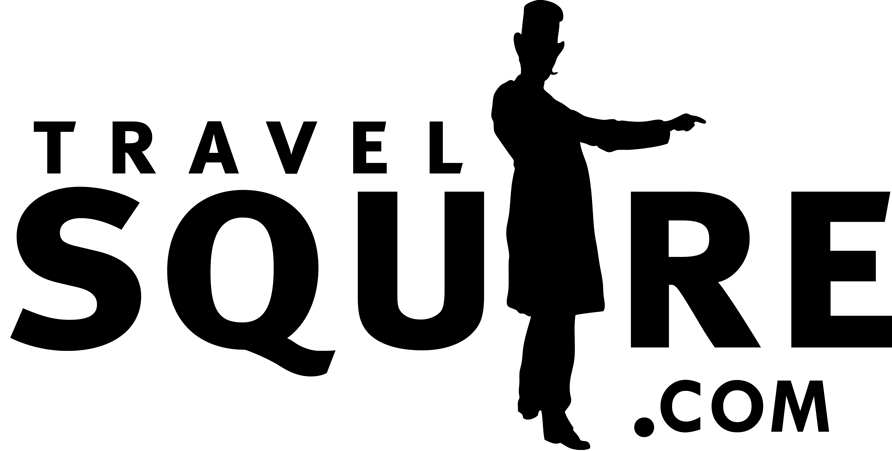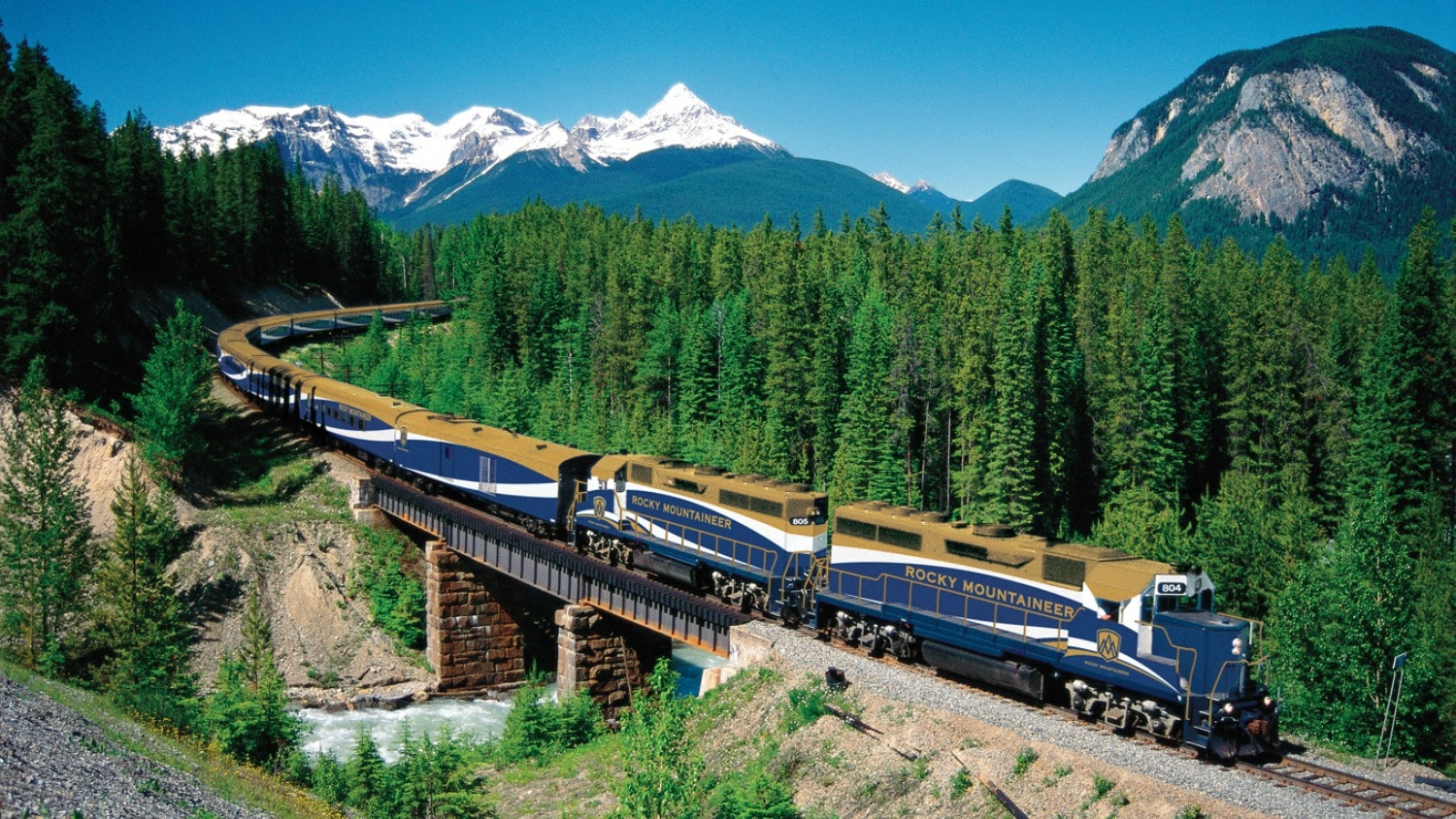“All aboard,” announces the service manager, and we’re off from Vancouver. Making our way within Canada, there are two options – the Rocky Mountaineer and VIA Rail – each a nostalgic adventure, each distinctively different. So, join me on the rails for the inside scoop on the maple leaf nation’s province-to-province train travel.
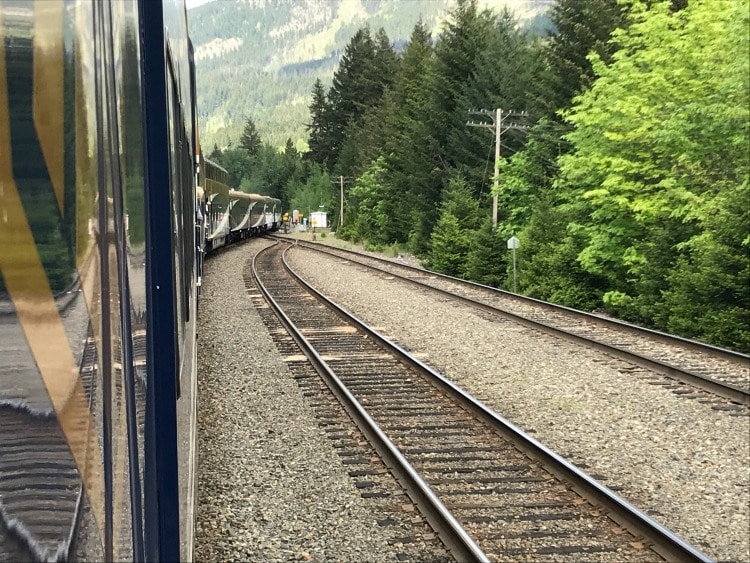
The Rocky Mountaineer
Entering the Rocky Mountaineer Station, there’s a sense of excitement. Daylight floods the room from full-length windows fronting the track framing our soon-to-be mode of transport. Beyond, an impeccable string of navy and gold train carriages is a grand sight. A whistle sounds and we’re ready to go with bagpipes blaring in the background. As we make our way we’re greeted by uniformed hosts and hostesses on a red carpet leading to the train. Scheduled departure is 8 a.m. but we’re off and running at 7:56 a.m. Practically an army of Rocky Mountaineer staff are lining the platform and waving goodbyes.
Onboard, train manager Peter Maseja, an 18-year veteran, introduces himself and shares a bit about our pending journey – we have 18 pieces of equipment, 506 passengers and our top speed will be 45 m.p.h. “What time do we arrive?” someone asks. His response is somewhat vague: “We share tracks with freight trains, so we never know,” he says. Turns out this is the honest to god truth for we never do learn the exact ETA, only that it would likely be after what’s scheduled.
The Rocky Mountaineer is a seasonal train (April – October) that adheres to a partial schedule for a simple reason – to maximize daylight. Its routes (Seattle to Vancouver, Vancouver to Jasper and mine, Vancouver to Banff/Lake Louise) are milepost to milepost chock full of astounding terrain, landscape that needs to be seen. Passengers stay in hotels at the half-way point – for me in Kamloops – their luggage unseen since boarding awaiting in their room.
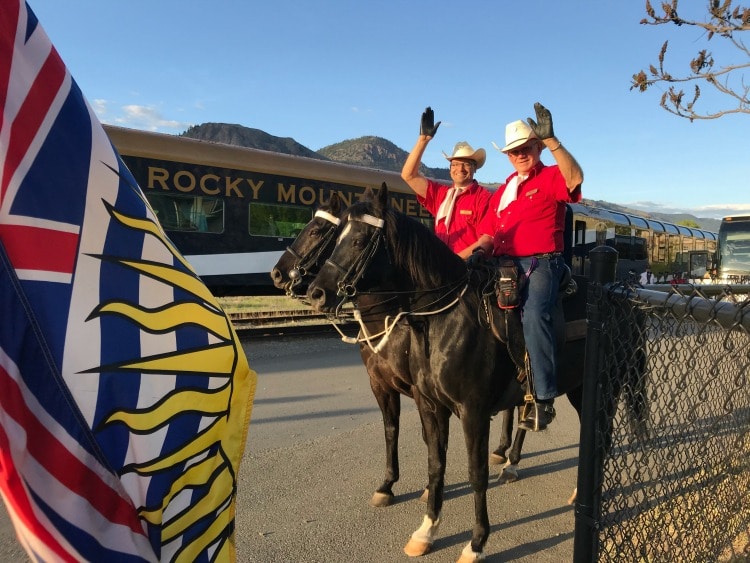
GoldLeaf Luxury
Traveling in its top-of-the-line premier class, GoldLeaf, the details are impressive. The bi-level car is topped with a 180-degree dome, comfortable (assigned) seats are equipped with trays for writing, organizing and the bevy of snacks served (preceded by a refresher towel). These range from warm-from-the-oven scones to chips and salsa and freshly baked cookies. Beverages (including beer, wine and spirits) are served throughout-the-day. On the first level is a formal white cover restaurant for breakfast and lunch. Most food is locally sourced and cooked onboard, and features choices such as a feta and spinach souffle for breakfast and short ribs for lunch. The best thing about the restaurant level is its rear open-air viewing platform for fresh air and photo opps.
Having done the Venice Simplon-Orient-Express trip years ago, Rocky Mountaineer is reminiscent of that line’s fine appointments; but unlike Europe’s luxury train, this one is augmented with informative commentary and loudspeaker announcements like “Bear on the right!” or “Moose on the left!” And, taking a curtain call as we pull into Banff station a “gang” of elk was sure enough there to welcome us along with a row of uniformed employees.
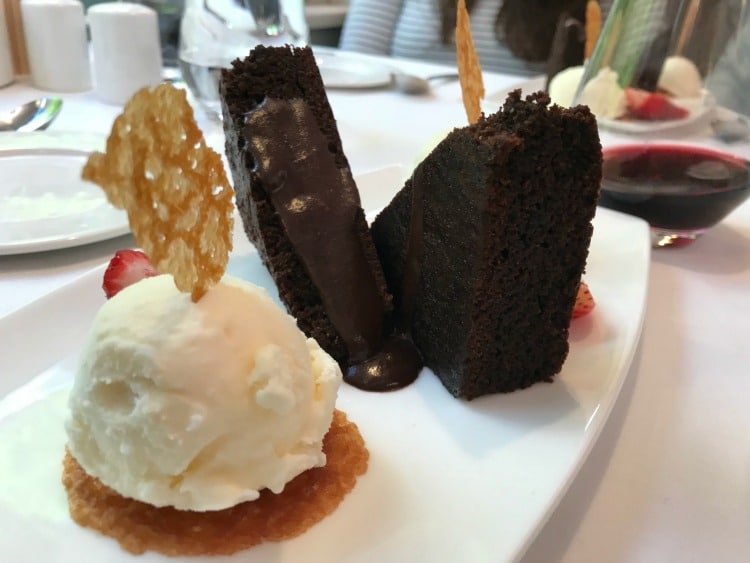
Excursion on Via Rail
Described as “real railroading” by fellow passenger and train enthusiast, John Mueller, there is something inherently romantic about an excursion on VIA Rail, a back-in-the-day peek into train travel of yesteryear. Having debuted more than 60 years ago and refurbished over the years, its sleek stainless cars still shout authenticity. My winter journey from Vancouver to Toronto aboard The Canadian consisted of four-nights, three-days, 2,775 miles, four time zones and the provinces of British Columbia, Alberta, Saskatchewan, Manitoba and Ontario. It began with congratulatory champagne while seated in the dome-observation car as we pulled out from Vancouver’s Pacific Central Station at noon on a Tuesday. The scheduled arrival in Toronto was for Saturday at 2 p.m.
With VIA Rail the train doubles as your hotel. Of the various options, my favorite is Sleeper Plus – a private cabin with bunk beds that convert to daytime seating, a sink and a private lavatory (sleeper cars offer a shared shower, for which I never had to wait). Stops are numerous, but the length is not, so the time is spent stretching your legs and breathing in Canada’s fresh air. Three meals are served each day with white cloth service and extravagances like prime rib, VIA Rail’s signature chocolate torte and comfort foods like fried chicken and burgers.
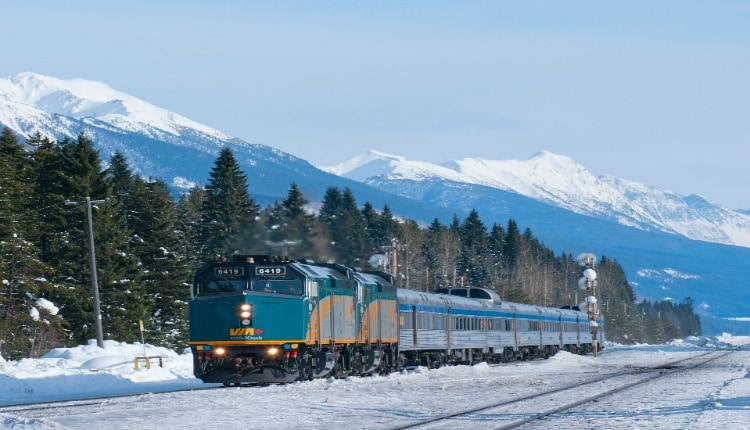
The biggest draws, however, were found outside the windows, always a winter wonderland – from white-topped Canadian Rocky peaks and wide-open snow-covered prairies to the season’s clear, dark skies punctuated by a canopy of stars (we’re told to look for a Northern Lights sighting on approach to Edmonton). Add to the mix an education on the meaning of the green, yellow and red signal combos and a graceful rocking to sleep when it’s bedtime. The result is sweet relaxation. And when pulling into Toronto’s Union Station, albeit a few hours late, parting is with sweet sorrow.
Tips for riding the Canadian rails:
Expect trains to be late and don’t book return flights or other transportation on the day of arrival.
Pad an extra day or two on the end of the trip to see Canada’s cities.
Consider off-season VIA Rail travel. Why? Rates are discounted and there are fewer passengers. Also, views are unobstructed (i.e. no tree-lined tracks) and there is 24/7 access for Sleeper Plus passengers to areas enjoyed by those in Prestige Class.
If booking in Sleeper Plus, book an F cabin for more space.
Pack light. Except for a small duffel, luggage is not allowed on the Rocky Mountaineer. When packing for VIA Rail, think airplane carry-on allowances – one personal item and a small piece of luggage.
